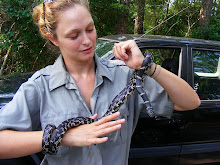Myrtle Beach is on fire, and I should probably be writing about that. In other news, our lab put out another major paper in pyrogeography and global climate change (I was not involved in this, but I think it is great) that discusses how fire in the Earth system is not only increasing due to global climate change, but is also a driver of it. This is also something I need to get around to writing about more in-depth, but I have to say, I have been a bit too busy lately to put together coherent thoughts. So maybe it's a good thing I'm not writing!
Studying fire, its behavior, and its movement into new landscapes is fascinating. But I got into this field because I want to somehow slow down the extinctions we are seeing now. I want to think about fire in terms of habitat enhancement and ecosystem health. But fire driving climate change... this is bad news.
I have become rather obsessed with the problem of mass extinctions and trophic cascades. I keep going to talks that say that global warming by itself will wipe out 1/3 to 1/2 of all life by 2050, or that invasive species will do that on its own by then... that sea ice -- all sea ice-- may be gone by 2013. This is going to be a much larger problem for us than the extinction of polar bears. By the way, here's what they look like while they are starving to death:

The point that all the scientists I talk to seem to agree on is that the changes we are about to experience are so large that we can't adequately predict their magnitude. For example, we can say that if we continue to release carbon dioxide at the same rate as we are doing now, the overall earth temperature will increase 4-6 degrees Celcius in the next 200 years. Even if we stop producing all CO2 right now, there's still a lag time in which the earth's temperature will continue to increase, and even at that lower level, there may be unpredictable events we are not accounting for, like a methane belch from the melting permafrost, or large scale fires that we can't fight but which produce enough CO2 in the short run to cause positive-feedback heating and what people sometimes call "runaway global warming," and sometimes call "global boiling."
Additionally, even though 4-6 degrees Celcius doesn't sound like a lot, the increased atmospheric CO2 in addition to the temperature change will cause almost all trees on earth to die. So in two hundred years, no trees. This is one element of the larger issue of "Tree Death." We are seeing increased tree death already, and in California, Sudden Oak Death makes the issue particularly visible.
The world is going to look very different quite quickly, and I don't know how I feel about being around to see it.
I got into this field because I love birds. But the problems are awfully big and hard to "solve." They're hard, on an emotional level, to even think about.
The earth has gone through major changes before. I guess I hate our current mass extinction so much because I think so much of it is or was preventable. Maybe I am wrong, and man, as an animal, is just unstoppably rapacious. I have begun hoping that whatever evolves next will bring back a large avian predator, like a Roc or a Pterodactyl.
I began a walking route to work that goes through the Valley Life Sciences building. They have a lot of interesting things in the hall there... one of which is a reproduction of the Archeopteryx fossil.

I love it. Look at it. It has feathers, but it doesn't have a beak like a modern bird. It's more lizardy. The position that it's frozen in, for all of eternity, is that of Icarus falling out of the sky. Maybe birds, having become too beautiful in flight and song and feathers and grace, have overreached somehow. Maybe they have outdone man in all but destruction, and are doomed to fall from the skies because of us.
When no one else is around I press my forehead against the glass and stare at the plate, and think.
The other attraction in the hall for me is the Pterodactyl. Boy do I love it. I could stare at it for hours. It looks like a big Kingfisher. Hooray Avian Predators! What a bird!




